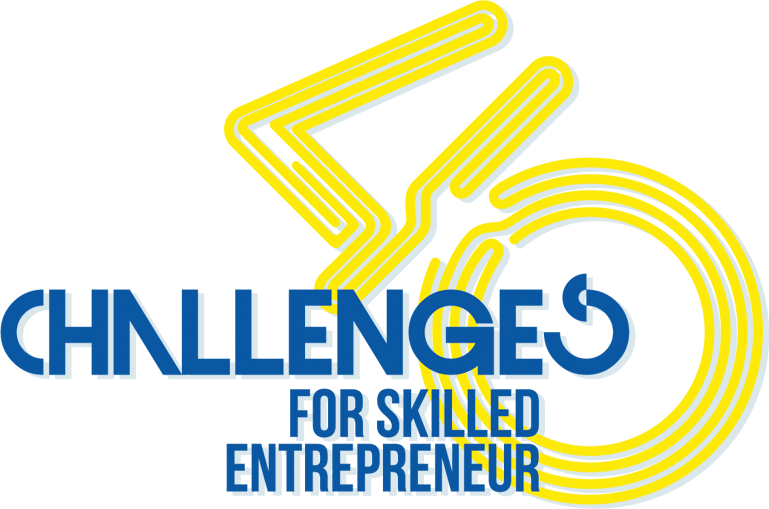The 40 Challenges Project presented and led by the University of Cordoba, Spain was approved and I & F is involved with other partner countries such as Romania, Poland, Lithuania and another partner from Spain.
Website
Our lovely website can be accessed through this address: http://www.40challenges.eu/
On our website you can find the work done over the past two years. The products are downloadable and you can also download our App both on Android and iOS systems.
Description of the Project
The Entrepreneurship has significant social value for the environment in which it takes place, which is not only economic. An appropriate Entrepreneurship is a source of economic development, social cohesion and response to social and environmental challenges. For entrepreneurship to occur effectively, it is necessary that certain social, economic and political conditions in society are met.
In this sense, there are many diverse backgrounds showing the critical value that actions launched for the promotion of entrepreneurial culture at all educational levels, have for the future of the territories.
The European Council in Lisbon in March 2000, defined education in entrepreneurship as the engine for a more dynamic enterprise culture, and the European Charter for Small Enterprises, adopted in June of that year, recommended that Member States concentrate their efforts on cultivating entrepreneurship and entrepreneurial culture within their national policies.
The Council of Ministers of Education of the European Union, held in February 2001, noted among future objectives of education systems, strengthening the links between educational institutions and companies, as well as the development of entrepreneurship in education and in training.
The report of the Commission of the European Communities on the Best Procedure, determines that employment, improving competitiveness and economic growth in Europe necessarily involves the promotion of culture of entrepreneurship, confirming therefore the need to have a national-regional education for entrepreneurship and entrepreneurial culture framework.
The project has a strong link with European employment, entrepreneurship and education policies. The “Europe 2020” strategy for growth and employment aims to achieve a 75% employment rate for the working age population (20-64 years). However, this objective has not yet been achieved, as Europe continues to face a high unemployment rate, especially for low-skilled adults (9.6 in January 2017). The situation of youth unemployment remains crucial, with an average youth unemployment rate of 17.7% in the EU28 in January 2017, rates in partner countries: In January 2017, the lowest rate was observed in Germany (6.5% ), While the highest were recorded in Greece (45.7% in November 2016), Spain (42.2%) and Italy (37.9%). (Source: http://epp.eurostat.ec.europa.eu/statistics_explained/index.php/Unemployment_statistics).
The European Commission recognizes that growth and employment in Europe depend fundamentally on ensuring that its population has the appropriate skills. However, the new findings of the OECD Adult Skills Survey (PIAAC) show a weakness: the skills of the working age population in Europe are not in line with the needs and demands of the labor market. A recent survey (http://archive.ja-ye.org/Download/CEO%20Survey.pdf) of more than 500 business leaders from across Europe found that most of them (54%) thought young people particularly lacked “Skills” (such as trust, teamwork, self-motivation, networking and presentation skills) are needed for entry into employment. Improving informal skills could be achieved through active participation in learning; However, student participation in lifelong learning remains very low, with an average participation of 9% and is far from the ET 2020 of the 15% set out in the European adult learning agenda. Participation rates are especially disappointing for low-skilled adults and the elderly.
The project partners made a pre-analysis of the European and national situations defined above and based on their knowledge, experience and knowledge to work with disadvantaged students in promoting their participation in the labor market, they defined the main needs within the project:
1. to promote the improvement of soft skills of pupils, consistent with key employment-related competences and focused on entrepreneurship, taking particular account of the individual learning needs of people with disadvantaged backgrounds and fewer opportunities;
2. to improve the quality of training offered by adult education organizations active in the field of entrepreneurship training in order to attract and motivate low-skilled people with a disadvantaged background and with fewer opportunities to learn.
The overall objective of this project is to promote the development of the soft skills of entrepreneurs through a self-diagnosis tool and a catalog of 40 adapted and innovative training challenges. All this through a mobile application.
• Identify the 40 key soft skills needed by a successful entrepreneur.
• Create a tool that:
-measures the degree of development of the 40 soft skills of the successful entrepreneur.
-Issue an individualized report on the degree of development of the key soft skills of the successful entrepreneur with recommendations for improvement through the training challenges.
• Develop innovative content for the training of the 40 soft key competences optimized for mobile phone.




